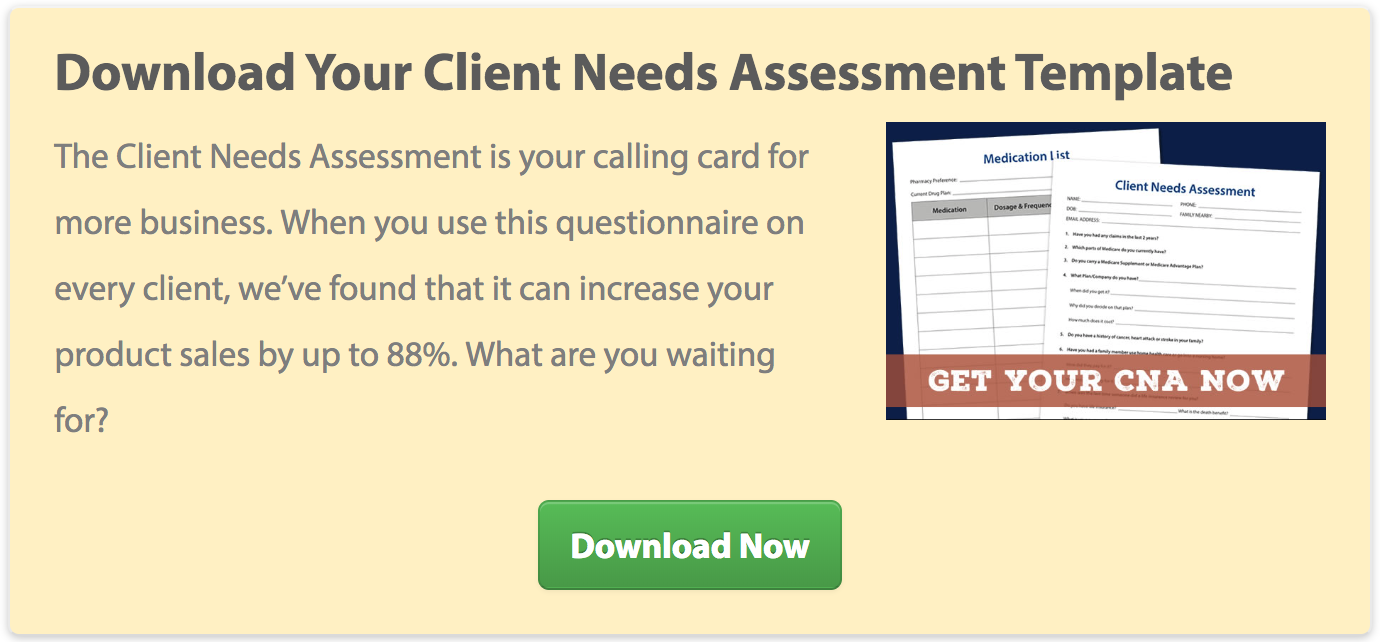People don't typically run around asking you what your salary is, but sometimes, those who live off commission sales – including senior market insurance agents – can be the exception.
So many people have been brainwashed into thinking that commissions are inherently evil. Surely, anyone who makes a commission off of a sale is only thinking about how much they'll make – not what's best for me, right?
This thought process goes beyond insurance; think about car salesman and even doctors. The Mayo Clinic addressed this issue by paying its providers a fixed salary – not commissions based on how many patients they see or how many prescriptions they can write.
Talking about commissions with clients can be tricky and uncomfortable, which is why we're diving into this discussion head-on. We're covering it all, from why your clients might be asking to what to say when they do confront you with the question.
What's the Real Meaning Behind Commission Questions?
If your client asks you what percentage commission you're making on an insurance product, it's probably for one of two reasons:
- Something sparked their curiosity
- They aren't sure they can trust you
Seniors Are Curious About Commission
Yes, the Department of Labor (DOL) Fiduciary Rule had a lot to do with this – insurance agent and broker commissions suddenly made it into the limelight, and it became a public topic of discussion (we'll cover more on this shortly).
People started wondering, "How much did my agent make off of that insurance policy I just bought?"
Also, the Annuity Disclosure Statement that is part of application packets can spark curiosity among clients, with statements like:
- We pay the agent or representative for selling the annuity to you. The actual percentage of compensation paid to the agent or representative will vary based on specific circumstances (Sentinel).
- Like any annuity issuer, Equitable incurs expenses to sell and issue its Policies, including the payment of a commission to its agents, and these expenses are taken into consideration when interest rates are established and reset. [...] (Equitable).
- The agent will receive a commission, based on the amount of the premium you pay. [...] The Company will provide total compensation in an amount that will not exceed seven percent of the gross premium you pay (Liberty Bankers Life).
It's easy to read one of these statements and immediately wonder, "What is your commission?"
Clients Want to Know If They Can Trust You
While some seniors get curious and need to satisfy that curiosity, the vast majority who ask aren't asking about your commissions at all. It's their way of getting to the heart of the issue, which is, "Can I trust you?"
If you hear commission-related questions often, it may be time to step back and ask yourself why?
Is it something as simple as a news story sparking interest, or is it something more in-depth, such as your clients wondering if they can trust your recommendations?
Being Proactive Can Stop Commission-Related Questions In Their Tracks
While we do want to have a planned response for when clients ask about your compensation (and we're getting there – we promise), the ideal solution would be to stop commission-related questions before they ever come up.
There are two ways to go about this:
- Be proactive and address your compensation, or present your value, before they even have the chance to ask
- Build credibility and trust from the get-go
Be Proactive
Being proactive in your presentations will not only help stop commission-related questions from coming up – they can help with all kinds of objections.
Five of the most common objections, like "I need to think about it" or "I can't afford that" can be stopped by being proactive. (Read about those here.)
Just hit the nail on the head before your client can sit there and wonder about it.
Kim Ream, Head of Regional Sales & Recruiting, also suggests selling the value of having a personal agent upfront. "I didn't get asked about commission often over my years of selling," she explains. "The personal relationship I had with my clients and their families dismissed the commission questions, in my opinion."
By seeing your clients often and being there when they call, you can build the value of being someone your clients can count on to protect their needs.
Build Trust
If a client isn't sure they can trust you, you will start to hear objections coming up. Sometimes, they're in the form of a commission-related question.
To avoid this from the beginning, you need to establish credibility and trust with your clients.
There are several ways to built client trust – here are a few we've covered in detail in the past:
- Go through a Client Needs Assessment to sell to your client's individual needs
- Showcase testimonials and reviews
- Become Facebook friends
- Education first – sales second
- Understand if you're talking to a cold, warm, or hot lead
- Acknowledge when your client already has a great plan and doesn't need to replace it
- Share with your client when you've bought the policy you're recommending
- Remember details about your client – a CRM can help
You may find that after implementing several of these business practices, you stop getting questions related to how much you're making on a policy you recommend.
Are You Required to Answer the Commission Question?
It's ideal to have an answer at the ready no matter what, but to cover our bases, we need to know: am I legally required to tell my clients how much I make?
Sometimes, it depends on your location. For example, in New York, if your client asks, you're required to disclose your compensation amounts (New York State Department of Financial Services).
And then there was the Department of Labor (DOL) Fiduciary Rule, which required advisors and brokers to give clients a disclosure agreement starting in April 2016. That rule vacated implementation by the Fifth Circuit Court of Appeals in 2018, but may now be coming back to life as the DOL works with the SEC (Forbes).
While the DOL Fiduciary Rule was scrapped on June 21, 2018 (Investopedia), the press it has received in recent years has created more curious clients.
The point here is that you aren't legally required to tell your client what percentage commission you're making unless your state laws say so. (Disclaimer: we are not lawyers.)
3 Ways to Respond When Clients Ask You About Commissions
While it's a somewhat rare occurrence for the agents I talked to, the commission question does come up on occasion. Here were some pointers they had.
1. You pay the same price for the same product.
 Luke Hockaday, personal producer and Director of Medicare Supplement Sales explains to Medicare Supplement clients that if you buy it from the carrier, it's the same price as if you bought it from him.
Luke Hockaday, personal producer and Director of Medicare Supplement Sales explains to Medicare Supplement clients that if you buy it from the carrier, it's the same price as if you bought it from him.
"I tell them that I do make a commission from the company, but the difference is if you have a question or need something, I am your agent and am here to help," he explains.
It's essential to differentiate yourself from the other options. Here are a couple of additional points you can make when building your value:
- As a broker, I can shop around and select from many different companies – if you buy directly from the carrier, they'll only tell you about their products.
- When you buy from me, you get to talk to the same person every time you have a question. When buying from a carrier, you'll likely never speak to the same person twice, let alone get through the phone without a 15-minute hold and a series of numbers and confusing robot questions.
Mainly, you want to convey that while the insurance company compensates you, it makes no financial difference to your client, and they get extra perks like more selections and better service.
2. All of your money earns interest from Day 1.
When talking about the kinds of annuities we offer to seniors – which is typically when the commission questions come up the most – it's important to talk about how your client's money is affected. Which, in short, it isn't.
 Michael Sams, personal producer and Director of Sales Training and Development explains, "You can explain that the company does not take your commission out of their principal. All of their deposit will start earning interest the next day."
Michael Sams, personal producer and Director of Sales Training and Development explains, "You can explain that the company does not take your commission out of their principal. All of their deposit will start earning interest the next day."
For example, if your client buys a 5-year MYGA and starts it out with $100,000, that entire $100,000 starts earning interest tomorrow.
At this time, Luke Hockaday also addresses the objection of potential annuity fees: "I say that all of your money will make interest from day one – there are no sales or maintenance fees that I get paid from the company."
Explaining this information upfront can avoid the commission question altogether.
3. Explain why there's a commission.
 Jeff Sams, CEO & Principal, explains that he's never found the question about commission to be a fragile or uneasy conversation. When clients ask him how he's paid, he hits the nail on the head with a brief explanation about why commissions exist.
Jeff Sams, CEO & Principal, explains that he's never found the question about commission to be a fragile or uneasy conversation. When clients ask him how he's paid, he hits the nail on the head with a brief explanation about why commissions exist.
Take banks, for example, which have a large overhead due to the building, employees, and everything that comes with running a bank. The insurance industry has found a more affordable way of doing business, which cuts out the need for a building, 401(k)s, and health insurance.
Jeff continues on to say, "The insurance companies worked out an agreement or a contract with me, and I am only paid by them if I deliver business to them. This allows the insurance companies to be much more competitive in the market space compared to banks and other financial businesses."
Jeff finishes off his commission discussion by telling the client that while this structure puts him at risk, he feels good knowing he is rewarded when his customers get the best without paying for all the extras, such as buildings, advertising, employee salaries, and everything else.
In his 38 years of doing business, this explanation stops the commission conversation in its tracks.
"I believe sometimes, a person can wonder how much we do make, but I find people like doing business with successful people," he says.
Put Your Senior Clients At Ease
Talking about money isn't the most comfortable topic for most people, but your goal is to put your clients at ease.
Remember that your clients are spending their hard-earned money on the products you're recommending – it's a natural response to make sure those recommendations are genuine.
By being proactive and building trust with your clients, you should stop most questions about commissions in their tracks. However, when they do come up, you should feel more prepared with a thought-out response.
Let us know in the comments – have you had clients ask you how much you make, and if so, how do you respond?







